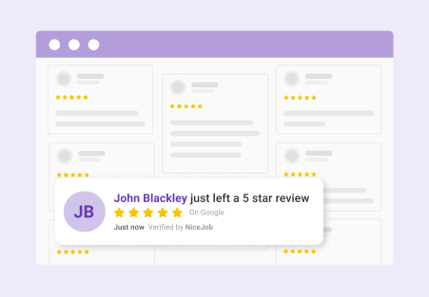How to Encourage Customers to Write Reviews: 6 Powerful Tips
Customers consider many factors before making a purchase and always prefer tried and tested products. This reliance on other people’s experiences makes customer reviews and ratings crucial in decision-making.
Just think back to a time in recent history when a positive customer review resulted in you choosing — or not choosing — a particular product or service.
Whether it’s a star rating, written, or both, customer reviews are a valuable tool because they:
-
They build your brand’s reputation
-
Determine how a customer will perceive your product - products reviewed highly by other customers are considered more trustworthy, and
-
Reduce your customer acquisition cost
According to McKinsey, “peer purchasing insights seem to have more influence on consumers than any marketing strategy.”
Even a marginal change in ratings can bring on explosive growth (or decline) for your products: tiny changes in star ratings can change product purchases by 30% to 200%, depending on the product category.
While getting customers to leave positive reviews for your business may seem challenging, this article will show you six quick, easy, and proven solutions that you can likely start using today to encourage customers to write reviews.
6 Ways to Get Customers to Leave Reviews
If you’re wondering how to encourage customers to write reviews, start by answering the following questions:
-
Have you just started, or do you already have well-established reviews?
-
Do you offer personalized services or standardized products?
Keep the nature and environment of your business in mind while using the following methods to get reviews.
1. Use Review Requests After Making a Sale
While this may sound like the most obvious thing to do, sometimes just asking your customers is enough.
If you genuinely believe that your products or services are good and you provide them with high-quality customer service, people will be happy to write you a positive review or at least rate their experience.
The best time to ask your customers for a review depends on your product. For example, a company selling shoes or clothes might want to wait for 15-20 days so that their customers have an opportunity to use their products. On the other hand, a company selling perishables should wait for a shorter duration.
If you offer a physical service, it’s worth asking your (hopefully) happy customers to write a review right after their dirty windows are now clean or their tight muscles are now relaxed.
Some people feel that that might be pushy or awkward. If that’s you, sending customers an SMS or email that provides links to your website is a great way to make sure you’re still generating positive customer reviews.
You can also display a QR code in your store or on business cards that will direct customers to whichever review sites you might have on Google, Facebook, or your business’ website where they can review your products or services, and hopefully maintain or even boost your average star rating.
It's worth noting that this is different from a Net Promoter Score, which measures a company's customer loyalty and satisfaction by asking a single-question survey and getting a score from -100 to +100 (with a higher score being better).
2. Send a Follow-up
Sometimes asking once is not enough. Your customers may be busy and, in all probability, interact with many brands daily.
Whether you write it manually or it’s built into a review campaign, you can send a follow-up email reminding your customer to write a review for you. This is especially easy if you have an eCommerce business, because you can directly send an email once the customer has made a purchase as part of your review funnel.
A few other ways of doing this are sending periodic SMSs to customers and putting up social media posts that encourage and even incentivize reviews.
Keep in mind, however, that repeatedly sending emails to customers can get annoying for them. As a best practice, we don’t recommend sending more than two follow up emails.
3. Feature Reviews

Market the reviews you get on social media platforms like Facebook, Twitter, and LinkedIn as well as your company website. When people see others doing something, they’re more likely to do it themselves.
Additionally, featuring reviews with free tools like the NiceJob social proof widget also gives customers a sense of recognition, further encouraging others to write reviews for your business.
4. Personalize Service and Give Context
The review process doesn’t have to be purely transactional. Customers are more likely to review your business if they feel a personal connection to it.
Try to personalize your service or product to make the customer feel important. Because they are.
This increases the chances of them leaving a review and is especially important if you run a smaller or newer local organization since you can have more opportunities develop a personal rapport with customers.
Additionally, if people understand why user reviews are essential for your business and future potential customers, they are more likely to write them.
And when they do, you can send them a personalized note or personal video explaining the value of their review.
Our advice: keep it simple and grateful.
Let the customers know how much you value their reviews and how it helps you build and strengthen your brand and in turn provide the customers with better, more personal experiences.
Once you secure a review, remember to respond to it with a sincere “thank you.” Some business owners will even give an incentive like gift cards in exchange for Google reviews, for example.
Customers who genuinely like your business will be understanding and support you if you have invested enough time building a connection with them.
5. Using Automation
You can automate the review process to save a lot of time and effort. Individually asking each customer for a review or manually sending follow-up emails can be difficult for most businesses.
When done manually, the process, like any other, is prone to human error and negligence. Automated software that links directly to your CRM can help you fast-track the process and get more star reviews and ratings for your products.
For example, you can automate sending emails (and follow-up emails) every time a customer purchases your product or service.
You can also consider online booking systems. Your customers will buy or book appointments through a portal and automatically receive a request to give a review once completed. Given that their experience is fresh in their minds, customers are more likely to leave good reviews.
6. Claim Your Business Online
One of the biggest reasons you might not get reviews is because your business does not have a page on Google or Facebook.
Claiming your business on third-party sites makes the process of searching and identifying your business easier for customers, encouraging them to leave reviews.
Keep in mind there are many third-party sites on which you can claim your business, and their popularity varies by country and industry. For example, TripAdvisor is a helpful site if you’re in the travel industry, while Zillow is a reputable real estate review site.
The Bottom Line When Asking Customers for Reviews
According to a 2022 Local Consumer Review Survey, 98% of people read online reviews and 84% of customers said online reviews are important or extremely important for service-based businesses.
But don’t panic just yet. You do not need a large marketing budget or a detailed management strategy to encourage customers to write reviews.
Instead, implementing simple and cost-effective strategies can work wonders.
NiceJob will help you boost your online reputation through reviews and referrals on sites like Google and Facebook. See how NiceJob works and experience the magic for yourself!




